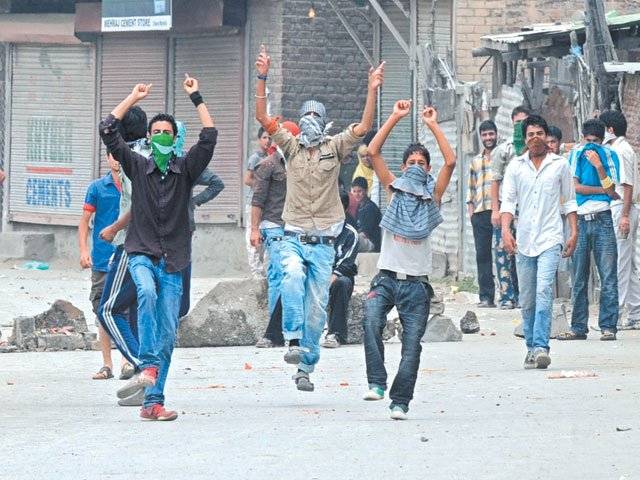NEW DELHI (Agencies) The head of the Indian army has called for a political solution to unrest in Kashmir, saying the military should step back from its security role in the region. Street violence in the Muslim-majority held valley has increased in recent weeks after the deaths of several unarmed civilians who were killed as troops sought to contain protests against rule from New Delhi. I feel there is a great requirement for political initiatives that take all people together, General VK Singh told the Times of India in an interview published Wednesday. Militarily, we have brought the overall internal security situation in Jammu and Kashmir under control. Now, the need is to handle things politically. Singh added that local police need to be more active to allow the army, currently numbering about 500,000, to reduce its presence in the region. The terror infrastructure in Pakistan remains intact, said Gen Singh. There are, after all, 34 'active and eight 'holding terror-training camps still operational across the border. Moreover, an estimated 500-600 terrorists are still active within IHK, with close to 50 percent of them being of 'foreign origin. Then, we have inputs that efforts are being made to revive tanzeems like Hizbul Mujahideen, which have suffered a lot in our operations, said Gen Singh. Infiltration attempts continue... great amount of efforts are being made to send militants into J&K. But we have strong and dynamic anti-infiltration and anti-terror grids in place, said the army chief. Whenever they (Pakistan army) become desperate, they indulge in ceasefire violations... this happened in Kishnaghati, Macchil and other areas recently. The threat from terrorists is still there. Its evident from the encounters we have been having, including the recent one in which we lost a brave colonel-rank officer (Neeraj Sood), he alleged. Given all this, its 'slightly premature to go in for more de-induction of soldiers from IHK even though militancy has been brought down to its lowest ebb since 1989-1990. We dont know how the situation will be after six months. We have to wait and watch and do a holistic assessment after that, he said. The strength of the security forces deployed in J&K is constantly reviewed. Decisions to reduce troops is based on a comprehensive assessment and to ensure there is no adverse impact on the overall security situation, he added. Gen Singh also reiterated his opposition to demands to either 'withdraw or 'dilute the iron-fisted Armed Forces Special Powers Act (AFSPA) from IHK, holding that 'adequate measures have been instituted at all levels to ensure its not misused. The armed forces are required to undertake operations in very difficult circumstances. If the J&K situation has come under control, its the forces which have sacrificed with their blood, he said. Police forces get protection under the CrPC. In similar vein, armed forces operating against well-trained and armed terrorists need legal protection. Any dilution/withdrawal of AFSPA may have an adverse impact on the security situation. We have seen this happening in Manipur, around Imphal, he added.
Tuesday, April 16, 2024
Indian army for political solution to Kashmir

IHC dismisses Bushra Bibi's plea seeking her shifting to Adiala Jail from Bani Gala
4:25 PM | April 16, 2024
Punjab CM visits Tehsil Headquarter Hospital Murree
3:25 PM | April 16, 2024
High-level Saudi delegation in Islamabad to hold meetings with Pakistani leadership
2:07 PM | April 16, 2024
Saudi foreign minister meets PM Shehbaz Sharif
1:17 PM | April 16, 2024
Decision to retaliate against Iran attacks rests with Israel, says Pentagon
1:05 PM | April 16, 2024
Political Reconciliation
April 16, 2024
Pricing Pressures
April 16, 2024
Western Hypocrisy
April 16, 2024
Policing Reforms
April 15, 2024
Storm Safety
April 15, 2024
Democratic harmony
April 16, 2024
Digital dilemma
April 16, 2024
Classroom crisis
April 16, 2024
Bridging gaps
April 16, 2024
Suicide awareness
April 15, 2024
ePaper - Nawaiwaqt
Advertisement
Nawaiwaqt Group | Copyright © 2024





